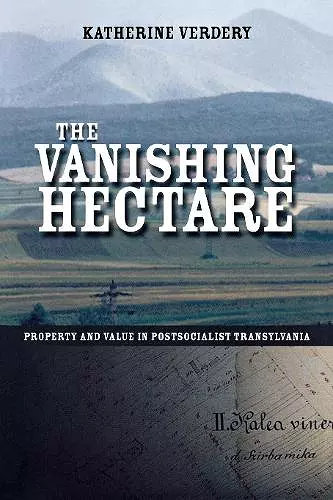The Vanishing Hectare
Property and Value in Postsocialist Transylvania
Format:Paperback
Publisher:Cornell University Press
Published:14th Nov '03
Currently unavailable, and unfortunately no date known when it will be back

In most countries in Eastern Europe and the former Soviet Union, the fall of communism opened up the possibility for individuals to acquire land. Based on Katherine Verdery's extensive fieldwork between 1990 and 2001, The Vanishing Hectare explores the importance of land and land ownership to the people of one Transylvanian community, Aurel Vlaicu. Verdery traces how collectivized land was transformed into private property, how land was valued, what the new owners were able to do with it, and what it signified to each of the different groups vying for land rights.
Verdery tells this story about transforming socialist property forms in a global context, showing the fruitfulness of conceptualizing property as a political symbol, as a complex of social relations among people and things, and as a process of assigning value. This book is a window on rural life after socialism but it also provides a framework for assessing the neo-liberal economic policies that have prevailed elsewhere, such as in Latin America. Verdery shows how the trajectory of property after socialism was deeply conditioned by the forms property took in socialism itself; this is in contrast to the image of a "tabula rasa" that governed much thinking about post-socialist property reform.
Verdery's 30 years of fieldwork research in Romania supplied the groundwork for The Vanishing Hectare, enabling her to offer some alternative versions of the changes in rural life and reasons behind the supposedly irrational behavior of rural people.... Her account is not so much of the laws and administrative paraphernalia that established private ownership but rather of the broader social and economic conditions that make for what the author terms 'effective ownership.'
- Andrew Cartwright (Anthropological Quarterly)Verdery's conclusions are bleak. She vividly describes how the efforts of individuals she depicts as conscientious, energetic, highly intelligent, and very charming all founder in the face of widening price scissors production costs and market returns.... The Vanishing Hectare showcases the value of long-term fieldwork—anthropology's core methodology—to illuminate the real-world consequences of wishful thinking, and deserves particular attention from scholars and practitioners concerned to understand the kinds of regime change formerly known as transition.
- Keith Brown (Slavic Review)Where the poet William Blake saw a world in a grain of sand, Ms. Verdery finds global collisions of values and culture in the manner that Aurel Vlaicu, a small Transylvanian town nestled at the foot of the Western Carpathian Mountains, privatized its landholdings after Romania's 1989 revolution.... Verdery often leavens her work with entertaining anecdotes.... Her intimate knowledge of the town proved useful when she delved into local corruption and ill feeling. Her larger critique of Western misprisions never dulls her eye for local failures.
- Richard Byrne (Chronicle of Higher Educat- Winner of Winner of the 2004 William A. Douglass Award in Eu.
ISBN: 9780801488696
Dimensions: 235mm x 155mm x 25mm
Weight: 907g
448 pages